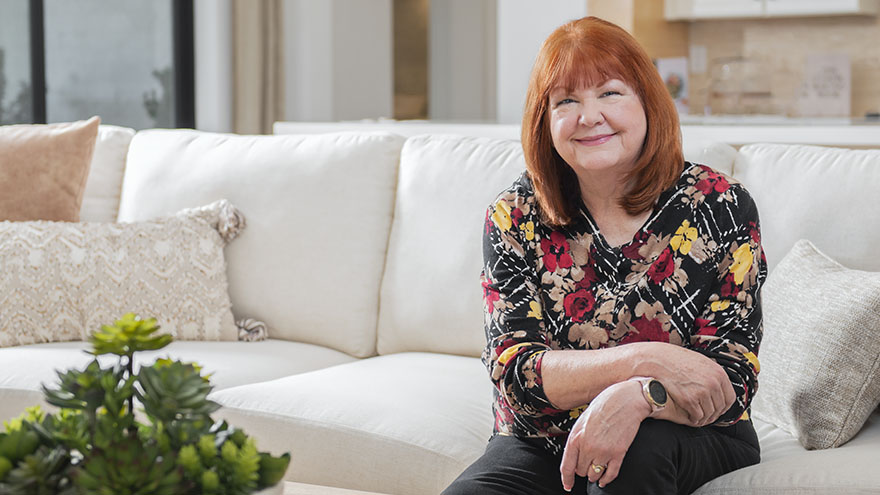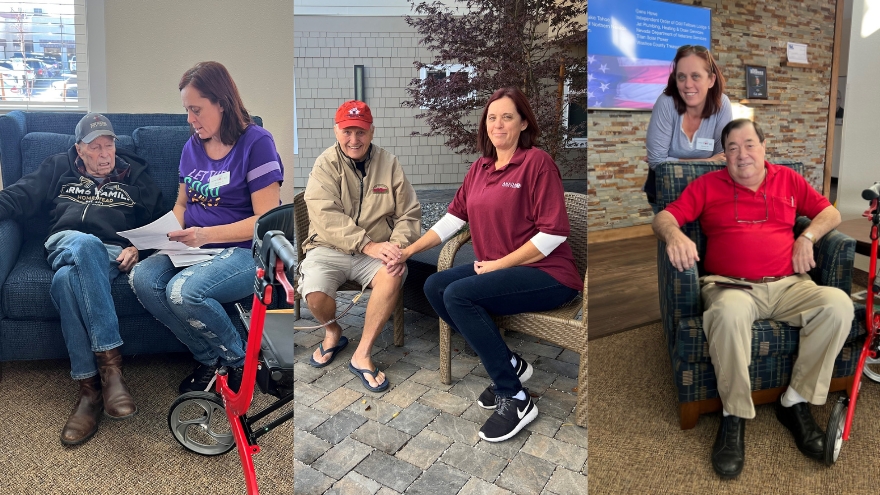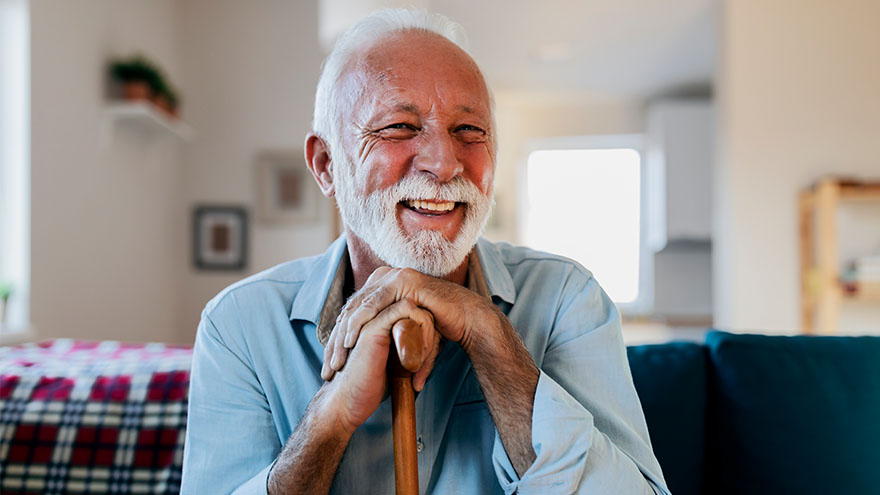Buscar
-
Sterling Silver Club Shining Stars: Mark & Dana Combs
Dana and Mark Combs met through mutual friends and had a long friendship before they became a couple in 2009. They were married in 2011 in a private ceremony at a small Reno chapel, and a few months later had a big celebration with their family and friends. Encouraging Others to Succeed Over the years, the happy couple has spent much of their time volunteering and giving back to others in their community. Twenty-six years ago, Mark became a bilateral lower limb amputee. For the past 10 years, he has been a prosthetic consultant, helping other amputees learn how to cope with various challenges and encouraging them to keep living life to the fullest. “Mark is great with helping people,” said Dana. Dana also does a lot of rewarding work through a Philanthropic Educational Organization (P.E.O). She is an advocate for raising money to help women ages 18 and up gain an education. Dana also enjoys tutoring English as a second language. Enjoying Quality Time, Hobbies & Travel When Dana and Mark aren’t helping others, they are spending time with their family and friends, their dog Mia (a 3-year-old Maltipoo) or enjoying one of their many hobbies. Some of Mark’s favorite things to do include playing Solitaire and strumming on his guitar. “I love to garden and play crossword puzzles and word games,” said Dana. “I’m really looking forward to the springtime to spend more time in the garden.” She loves to work out and has a membership at the UFC gym in Reno through her Senior Care Plus gym benefit. Dana also has her own online Etsy store, where she sells homemade jam jars, candle holders and vintage dolls. “Last summer I sold my first edition Barbie that I got when I was 9 years old,” said Dana. “I made quite a profit on it.”
Read More About Sterling Silver Club Shining Stars: Mark & Dana Combs
-
Patty Warren A Woman of Strength and Resilience
Meet and get to know Patty Warren, our featured Sterling Silver Club member this fall. You may recognize her from the latest Senior Care Plus commercial on television, where she joins a coffee chat discussing the many benefits of being a Senior Care Plus member. She’s one of the kindest souls you’ll ever meet – and has a positive outlook on life that we should all strive for. Patty's Story Patty was born and raised in a small Kansas town called Baxter Springs, where she grew up with an older brother, an older sister and two younger sisters. She and her siblings all enjoyed playing sports like softball and basketball, in addition to playing instruments. Patty developed a love and passion for music at a young age that carried into her adulthood. “I wanted to be an opera singer,” said Patty. “I decided to go to college at Pittsburg State University in Kansas where I majored in vocal performance.” After college, Patty moved to Manhattan in New York City to audition to be an opera singer, but she soon realized it wasn’t what she wanted to do after all. She eventually decided to work in the brokerage industry. After living and working in New York for three years, Patty moved back to Kansas where she later met the love of her life, Michael. “In 1992, I had put a dating ad in the local newspaper,” said Patty. “I received over 30 responses, and I went out on quite a few dates.” Then she had her first date with Michael, and the two of them quickly realized how much they liked each other. He asked her to marry him on Valentine’s Day in 1993, and they went on to get married in front of the Justice of the Peace on May 3, just a few months later. “We had a small wedding so that we could move into our first home together,” said Patty. A few years later in 1999, Patty and Michael moved to Arizona, where they lived for 22 years. Patty worked at Edward Jones Investments for 18 of those 22 years and loved her job and the people that she worked with. She retired in January 2021 during the pandemic, and three days later she and Michael moved to Sparks, Nevada.
Read More About Patty Warren A Woman of Strength and Resilience
-
A Friend to Veterans, A Friend to Renown
Did you know that 218,000 veterans and their families call Nevada home? That is almost 7% of our total population who served this country and will require quality access to healthcare at some point in their lifetime. When faced with a daunting diagnosis or procedure, such as cancer or surgery, Renown rises to the occasion to provide veterans and their loved ones with the highest caliber of care possible to protect the lives that protected ours. Accessing that care, however, can be a challenge for some. As Renown serves veterans across 100,000 square miles, veterans living in rural communities often must travel long distances – with the costs of overnight lodging standing in the way, making healthcare access out-of-budget, and sometimes, nearly impossible. That’s where Veterans Guest House comes in. Veterans Guest House provides veterans and their families with temporary overnight accommodations while receiving medical treatment in the Reno/Sparks area. Founded in 1993 in response to the growing number of veterans sleeping in their cars to access healthcare, the nonprofit embraces veterans and their families who would otherwise not be able to obtain the medical care they need because of inabilities to pay for overnight lodging. A support system for veterans, especially veterans who are senior citizens, is vital to their overall health and well-being – and seniors at Veterans Guest House never have to feel alone in their care journey. Enter Dyana Parks, a senior care assistant working with Veterans Guest House. A friend to Renown Health and the William N. Pennington Cancer Institute, Dyana goes the extra mile for seniors staying at Veterans Guest House – she not only helps them navigate the logistics of their care, but she also is one of their biggest mental well-being champions. A Helping Hand for Guests in Need A proud member of a veteran family herself, senior and veteran in-home care is a family affair for Dyana. With a sister experiencing post-accident brain damage, elderly parents – one of whom facing dementia – and a son and daughter-in-law in the same field of work, Dyana has a unique passion for in-home and dementia care and holds several decades of hospice experience. As such, when she was assigned to help the clients at Veterans Guest House in September 2022, it was a natural fit for her, and she immediately jumped into action. Dyana takes special time during her work hours to transport seniors in need to their appointments at Renown (and keeps track of all of them), sits with them through chemotherapy and radiation treatments, ensures patients stay hydrated and nourished after major procedures, picks them up from surgery and always ensures everything goes well with each patient’s care. When patients coming from Veterans Guest House need extra emotional support, Dyana is always there to make sure they are okay and push them to keep going. “I always say to my seniors, ‘never give up,’” said Dyana. “If a need arises, I am there to help. I love getting to know my clients and helping them go home healthy.” As a ‘frequent flier’ at Renown and the William N. Pennington Cancer Institute, many of our team members are thrilled when they see Dyana walking through the doors with her clients, as they know that their patient is going home with one of their strongest advocates. To Dyana, Renown is akin to a family for both herself and her clients. “I love Renown,” said Dyana. “Everyone there makes my clients feel as though they are more than just a patient – they make them feel like family, especially when going through a scary diagnosis like cancer. As someone who has been going there with my own family forever and who now guides veteran seniors through the process, I will always recommend Renown to anyone.” Dyana emulates exactly what it means to make a genuine difference in the health and well-being of our community, all while raising awareness for both Renown and Veterans Guest House. “More people need to know about Veterans Guest House,” said Dyana. “When I came here, I was in awe. They do so much for every guest, making them feel comfortable at home while not having to worry about finances. Almost everyone that comes here, whether it be from the rural surrounding towns or all the way out to Alaska and even the Philippines, needs treatment of some kind, and I know Renown will always give them the best care.” To learn more about Veterans Guest House, visit veteransguesthouse.org.
-
2 Errores peligrosos en el asiento del automóvil y sus soluciones
Car seat mistakes can have very serious consequences. Misuse of a car seat can injure your child, or fail to keep them safe in the event of a crash. A lot goes into finding the right car seat for your child. With so many factors to consider (including age, weight and height of the child, type and brand of a car seat, cost of the car seat, etc.) it can be easy to forget critical factors. Here are two common mistakes that certified technicians often find when speaking with parents. Mistake #1: Getting a used car seat without knowing its history Why: A used or secondhand car seat can pose several factors that can compromise its safety in a crash. First, car seats expire six to ten years after their date of manufacture, so refer to the car seat's manual for recommended car seat longevity. The safety mechanisms can be compromised if a car seat has been in a crash. So it's crucial to replace your car seat following a collision. Solution: Only use a car seat if you know its history. A new car seat is your best bet, as they are up to date on the latest safety guidelines, and safety mechanisms are up to standard. However, if you are considering a used car seat for your child, please ensure the following: The car seat has never been in a car crash. The car seat isn't expired or outside the manufacturer's recommended longevity. It comes with the car seat manual and has all safety labels, including manufacture date, model number, and use instructions and restrictions. The car seat or any of its parts have not been recalled. The overall state and integrity of the car seat and its parts are undamaged. The carseat or any of its parts have not been recalled and are present and in working order.
-
Departamento destacado: Infection Prevention
Hygiene in healthcare is an essential backbone to providing the safest, most optimal care to every patient. From everyday handwashing techniques and getting all necessary vaccinations to surveilling our health system before the onset of outbreaks, at Renown Health, creating and maintaining a low-infection environment is a group effort. From ensuring fundamental infection prevention practices are carried out to identifying process improvement opportunities, Renown’s Infection Prevention (IP) department is here to help care teams be successful in their role. This effort is led by members who are devoted in sharing evidence-based best practices to our patients, employees, healthcare organization partners and community. Making “Zero” A Reality Reducing healthcare-associated infections is possible when core infection prevention practices are incorporated into the daily care of our patients. These team members are dedicated to Renown’s commitment to creating a culture of Excellence, caring for our healthcare environment, and our care teams. “Often times, when asked what we do in our work it can be a challenge to answer because unpredictability is built into almost every day; and in that, we as a team must divide and conquer,” said Susanne James, Manager of Infection Prevention. Every day, each team member is assigned a day to perform required surveillance activities. Whether they are reviewing patients’ infections and isolation and evaluating lab orders for possible infectious processes or reporting communicable diseases to the local health authorities and the CDC, every Infection Preventionist participates in improvement projects and address issues as they arise. The Infection Prevention team plans, organizes, manages and evaluates the Infection Prevention Program and ensures IP policies reflect current best practice. They work closely with all departments at Renown in order to achieve high levels of standards that are implemented to reduce transmission of infection. “As a team, we perform ‘Infection Prevention Environment of Care Rounding’ on all units and departments to ensure our environment complies with regulatory requirements,” said Erika Clark, Operations Analyst at Renown Health. "We work together with Facilities and Site Practice Leaders to ensure a safe environment.” The pandemic challenged all Renown teams to find creative solutions for issues no one ever imagined. Our Infection Prevention department worked tirelessly alongside Renown's Hospital Incident Command Structure (HICS) and care teams in creating several lines of defense against COVID-19, including: Launching Renown's Alternate Care Site to meet the need for critical patients. Bringing on the new lab tests and specimen collection criteria. Managing demand for personal protective equipment (PPE). Bringing vaccines to staff and then to the community. Managing ill employees and our visitors. Keeping all locations informed on pandemic status and changes (which were occurring at breakneck speed). These initiatives enabled Renown's care teams to focus on providing the safest care possible to patients saving countless lives. This solidified the fact that together, the team can accomplish anything. “Infection Prevention is proud to be a valued and respected member of the care team,” said Susanne James. “We appreciate being a trusted resource and take this responsibility seriously as this enables us to provide staff the best possible tools to be successful.” Fight the Good Fight Against the Spread of Disease Educating patients and providers plays a huge part on the Infection Prevention stage. This team provides educational materials on a range of topics, some of the most important are, proper hand hygiene and the use of PPE. All these materials can be found throughout our health system and serve as an important reminder – infection prevention starts with all of us. “We partner with every aspect of the health system – environmental services, nutrition services, lab services, facilities, pharmacy, physical therapy and occupational therapy, respiratory care, patient access, security, nurses, providers and quality...just to name a few!” said Susanne James. Our Infection Prevention team also partners with Washoe County Health District and other public health agencies to report – and in turn, stop the spread of – diseases and exposures. These close partnerships poise our team to do what we do best: Fight the Good Fight. “I greatly appreciate everyone in the IP department for sharing their expertise as I learned a new position,” said Erika Clark. “I love working with my team and how closely we work with other departments to ensure excellence in all we do.” Our health system is ever-changing. But according to the experts in our Infection Prevention department, the three main ways to prevent illness and disease that remain the same time and time again are to: Clean your hands. Hand hygiene is the most effective way of preventing the spread of infections. The CDC recommends washing your hands with warm soap and water for 15-20 seconds or using an alcohol-based hand sanitizer. Clean your hands often and assist our patients to do the same. Learn expert hand-washing advice here. Get vaccinated. Immunizations are one of the top methods you can embrace the fight against preventable diseases, such as COVID-19, flu, measles, tetanus and more. Discover how you can get vaccinated with Renown. Keep germs from spreading. Practice good hygiene by covering your cough or sneeze or wearing a mask and sanitizing frequently touched spaces. Stay home if you feel ill to prevent the spread of illness and infection. Be sure to bring up any illness concerns with your primary care provider. “Every aspect of our health system has an infection prevention component, and we work daily to ensure our staff, patients and visitors are providing and receiving care free from potential harm or infections,” said Susanne James. “We are often the first call staff make when they have questions, concerns or just need someone to help improve process or outcomes.” Reveling with Renown Proudly defining themselves as a “small but mighty” team, the six-person Infection Prevention department moves mountains to ensure the safety of anyone who walks through Renown’s doors. The tight-knit nature of this team can be felt from miles away, and to them, being “small but mighty” is not a hindrance, as they have the support of the IP Champions and the entire health system. “I originally came to Renown in 2018 as a nurse traveler, the facility and people I worked with immediately made an impact on me,” said Brian Stroud, Infection Preventionist at Renown Health. “My wife and I chose Renown and Reno due to the positive impact the people had on us. Everyone is welcoming, helpful and caring. Now, I am a full-time employee, and the team has made my transition into infection prevention trouble-free." Renown’s mission of providing a genuine difference for the health and wellbeing of the community is heightened and echoed by the Infection Prevention team. “I chose Renown because of the reputation Renown has earned in the community because of the excellent care and level of services provided,” said Shannon Oriola, Infection Preventionist at Renown Health. “I absolutely love this team and my Renown family!” “What brought me to Renown was the opportunity to acquire diverse skills which then motivated me to pursue my master’s degree,” added Paul DeLeon, Infection Preventionist at Renown Health. “What keeps me here is the people – Renown attracts hard working, ethical and caring people.” "My wife and I loved coming out to the Nevada mountains on vacations," added Russ Laarman, Infection Preventionist at Renown Health. "After being in Michigan for 47 years, we took the plunge and made NV our home. The experience has been great! I work with a great team that is very knowledgeable and works hard to ensure positive outcomes for our patients and colleagues at Renown.” Their pride shines through with their own individual accolades, both inside and outside of work. This past year: Shannon Oriola received a scholarship from the Association for Professionals in Infection Control and Epidemiology (APIC) for “improving outcomes through knowledge and practice,” which provided her with a $1,000 scholarship to attend the annual APIC conference in Indianapolis. Paul DeLeon earned his Certification in Infection Control and Prevention from APIC. Erika Clark completed Renown’s High Potential program, a six-month program that gives employees hands-on learning experience with several competencies, including emotional intelligence, effective communication, building successful relationships and organizational knowledge. Brian Stroud and his wife Charla became official Nevada residents. Russ Laarman scaled Mount Whitney. ...And the list keeps growing! Charged with the goal of keeping disease spread at bay, our Infection Prevention team remains vigilant and dedicated to their mission. Their commitment to Renown and to keeping our health system clean and healthy proves the age-old saying true: not all heroes wear capes. “I’m so very proud of the work Infection Prevention does every day, working with the vast teams throughout the health system to improve lives,” said Susanne James. “We would like to thank all of you for protecting the health and safety of your colleagues, our patients and the community.”
-
How to Talk to Your Children About Vaping
According to the Centers for Disease Control (CDC), e-cigarette use isn’t just up among adults, but it has also tripled in usage for teens. Dr. Jose Cucalon Calderon, a Pediatrics Physician at Renown Health and an Assistant Professor of Pediatrics at the University of Nevada, Reno School of Medicine, provides helpful insight into e-cigarettes and the dangers it poses to kids and teens. What Are E-Cigarettes? E-cigarettes are electronic nicotine delivery devices. e-cigarettes use liquid nicotine as an alternative to traditional smoked cigarettes. e-cigarettes contain nicotine which is an addictive substance with known toxic side effects that, when released in very high doses, that can have health consequences and causes addiction. Nicotine is described as “toxic,” but the most "toxic" part of e-cigarettes' is everything else within the E-juice. Nicotine mainly keeps people coming back for more. According to the CDC, e-cigarettes are also advertised using the same themes and tactics that have been shown to increase youth use of other tobacco products, including cigarettes. In 2021, approximately 76% of students reported exposure to tobacco product marketing through traditional sources, and approximately 74% of students who used social media had seen e-cigarette–related content. What Does This Mean for the Health My Teen? We know that nicotine can affect brain development in kids and teens, so it is important to educate your teen on the risks of exposure. If you have young children in the home, it is important to be vigilant as well. One teaspoonful of liquid nicotine can be fatal for a young child. How Do I Monitor My Teen for E-Cigarette Use? Monitoring your children can be tricky for parents. E-cigarettes can be harder to detect, unlike traditional cigarettes that were easy to detect by smell and residual odor. E-cigarette use, or “vaping,” is often associated with a dry cough or chronic throat/mouth irritation. Overall, increasing research shows strong links between mental health conditions and posterior combustible tobacco use along with increased risk of marijuana use. Nicotine is addictive, but it does not cause altered mental status like the other drugs of abuse can. All parents are strongly encouraged to talk to their children about the potential dangers of e-cigarettes. What are the health risks of vaping? Vaping devices have been on the market for a relatively short period of time, with evidence-based health effects and complications still being discovered. Vaping effects poses many harmful risks to children and teens. The risks of vaping include: Chest pain Difficulty breathing Dizziness Headaches Impaired response to infection in the airway Inflammatory problems of the airway Nausea Nicotine addiction Seizures Vomiting For more information for both parents and teens about quitting smoking or vaping, you can click here. Parents can also use this tip sheet from the U.S. Surgeon General to talk to their child about vaping. The Substance Abuse and Mental Health Services Administration free national helpline number is 1-800-662-4357 (HELP). It is available 24/7, 365 days a year offering confidential treatment referral and information (in English and Spanish). If you or someone you know is facing a substance (or mental health) problem, please reach out to them.
-
Know Before You Go
Grab your skis, goggles, coat – and don’t forget that helmet. Skiing and snowboarding are fun activities for all ages but come with the risk of injury. Read on for tips to make it a safe day on the mountain. Daydreaming about your next trip to the slopes? We talked to Jared Worchel, DO, about his top tips for gearing up. Get the Gear Before you head out to ski or snowboard, make sure you have all your gear ready and in good condition. Everything should fit correctly so that it keeps you as safe as possible. Wearing proper gear will also help keep you warm. Items to check on before you head out include: Boots Bindings Goggles Poles Helmet Outwear Gloves Pack water and snacks in case the drive takes longer than you except due to weather or traffic. You’ll also want to make sure that your cell phone is fully charged before you head out in case you need to contact friends of staff for help while on the mountain. Helmet, Helmet, Helmet Having a helmet that fits correctly is the most important thing you can do to prepare for a safe day on the mountain. According to a National Ski Areas Association study, helmet use has increased over the last 15 years, with 80 percent of skiers and snowboarders using helmets. Schubert would like to see that number increase to 100 percent. “If you have a head injury it could take you out for the rest of your life,” Dr. Worchel said. “The most important things to think about when fitting a helmet are making sure that it really fits you appropriately. You want to go into a store and try on as many different helmets as they have available. I know it’s tempting to buy one online, but you’re never going to know if it fits correctly.” If you are in an accident, your helmet’s fit can help protect you. Dr. Worchel has some tips on fitting: A helmet should fit low and snug over the head. Make sure that the helmet doesn’t wiggle or feel loose. Look for a model that has adjustability in the back, which will help you make sure it fits snugly. F ind a helmet with a chin strap that will help it stay in place throughout the day.
-
What You Need to Know About the Medicare Annual Enrollment Period
Don’t worry, there’s still time to enroll in a Medicare plan! You’ve probably noticed all the advertisements lately encouraging Medicare beneficiaries to enroll before AEP ends on Dec. 7. But what is AEP, and how can you ensure the best decision for Medicare enrollment? If you’ve been asking yourself this same question, you’re in the right place. Here we’ll explore some of the most important things you need to know before you choose your Medicare plan for 2023. What is AEP? AEP stands for Annual Enrollment Period, and for Medicare this takes place Oct. 15 – Dec. 7 every year. You might hear people refer to AEP as Open Enrollment or the Fall Enrollment Period. All Medicare beneficiaries can enroll during this time, and their new policy will take effect on Jan. 1 of the following year. If you’re already enrolled in Medicare Parts A & B, you can use AEP to enroll in a Medicare Supplemental or Advantage Plan. You can also choose to drop your Supplement or Advantage Plan and revert to traditional Medicare.
Read More About What You Need to Know About the Medicare Annual Enrollment Period
-
Top Safe Sleep Tips for Your Baby
Becoming a parent for the first time means lots of new unknowns – from learning to breastfeed and swaddle to buckling your newborn into the car seat for the first time. But when it comes to putting them to bed safely, it’s important to remember it really can mean life or death. It’s something we’re taught before our little one is even here: the correct way to put your baby to bed safely. Sadly though, the number of infant deaths continues to climb. The main culprit of sleep-related infant death continues to be all the items parents leave in the crib with their babies. According to the Center for Disease Control and Prevention, there are about 3,500 sleep-related deaths among babies each year. “The best advice is ‘bare is best.’ Keep your infant’s sleep space clutter free – no blankets, bumpers, toys or pillows,” said Karen Wagner, Pediatric Nurse Practitioner. Follow the ABCs for Safe Sleep Remembering the ABCs is an easy way to remember how to put your little one to bed safely. A: Alone No blankets, toys or pillows. “We do recommend using a sleep sack as a blanket alternative,” said Karen. “It prevents the risk of suffocation and keeps your baby warm.” Keep in mind, the greatest risk for suffocation happens when babies are under 1 year of age, so it’s best to save the toys, blankets and pillows for their “big kid bed,” or around 18 months old. B: Back The slogan “back is best” is another good reminder. Keeping your baby on their back until they’re old enough to rollover helps reduce the risk of Sudden Infant Death Syndrome (SIDS). C: Crib It is best to have your baby sleep alone in their crib. While co-sleeping may be enticing, especially after a late-night feed, it increases the risks of possible suffocation. However, “having your child in your room, in their own crib or bassinet, is protective for SIDS,” Karen said. “In fact, we think co-rooming reduces SIDS risk by almost 50 percent.” Co-rooming allows parents to keep new babies in close reach and helps parents oversee their baby’s sleep, just in case something happens.
-
What Every Parent Needs to Know About SIDS
Although the exact cause of Sudden Infant Death Syndrome is unknown, there are steps parents and caregivers can take to reduce the risk. Here's what every parent needs to know. SIDS is the leading cause of death in the country in infants in their first year of life. However, the exact cause of SIDS still remains a mystery, though it is often attributed to unsafe sleeping practices. Karen Wagner, a Pediatric Nurse Practitioner at Renown Health answers some of the most commonly asked SIDS questions. Protecting Babies from SIDS: Always place babies on their backs when putting them to sleep for naps and at night. Use a firm sleep surface, such as a mattress in a safety-approved crib, covered by a fitted sheet. Share your room – not your bed – with your baby. Your baby should not sleep in an adult bed, on a couch, or on a chair alone, with you, or with anyone else. Keep soft objects, such as pillows and loose bedding, out of your baby's sleep area. Do not smoke during pregnancy or around the baby; these are strong risk factors for SIDS. The risk of SIDS is even greater when a baby shares a bed with a smoker. To reduce risk, do not smoke during pregnancy, and do not smoke or allow smoking around your baby. Your SIDS Questions Answered: Who's most at risk? Three out of five SIDS victims are boys. African American and Native American infants are twice as prone to the syndrome. Other groups at increased risk include preemies, low-birthweight babies, and infants exposed to cigarette smoke. Is putting my baby down on their back really that important? It's vital. Back-sleeping increases a baby's access to fresh air and makes her less likely to get overheated (another factor linked to SIDS). I put my child to sleep on their back at night, but can I let this rule slide for a short nap? It's not worth the risk. Babies who normally sleep on their back are 18 times more likely to die of SIDS when placed down on their tummy for a snooze. Is side-sleeping safe? No. Studies show that putting a baby down on her side rather than on her back doubles the SIDS risk. It's easier for an infant to roll onto her tummy from her side than from her back. I'm worried about my baby getting cold. Is it safe to cover them with a blanket? Wait until their first birthday. Blankets, pillows, comforters and stuffed toys can hinder your child's breathing; even soft or improperly fitting mattresses can be dangerous. If you're worried that your little one may get chilly, swaddle them in a receiving blanket or use a sleep sack.
-
3 Reasons to Choose a Senior Care Plus Health Plan
Senior Care Plus was Nevada’s first Medicare Advantage Plan and is still providing healthcare coverage to qualifying members in Washoe, Carson City, Clark & Nye Counties. Senior Care Plus is administered by Hometown Health, the insurance division of Renown Health. That relationship means Senior Care Plus is the only Medicare Advantage Plan supported and accepted at Renown. This preferred access to Renown is a great benefit for northern Nevadans. When it comes to healthcare coverage, there are three key factors to keep in mind. Here’s why a Senior Care Plus Medicare Advantage Plan is your best choice. 1. Cost Cost matters when searching for the right insurance plan. Of the four Senior Care Plus plans available to residents of Washoe County and Carson City, three offer a zero-dollar monthly premium and all of them offer zero-dollar primary care office visits. That means no out-of-pocket costs for you. Additionally, all Senior Care Plus plans have an annual out-of-pocket maximum. This means when you reach this amount, that’s all you will pay. Senior Care Plus pays all other covered medical benefits for the rest of the year. That’s the beauty of a Senior Care Plus Medicare Advantage Plan. 2. Size of Provider Network and Accessibility Although saving money is important, it’s more important to be able to see a doctor when and where you need to. Senior Care Plus members enjoy the most comprehensive healthcare provider network in the region. Thousands of providers, including many hard-to-find specialists, are in the Senior Care Plus network. Since Senior Care Plus is part of the Renown Health family, you get priority access to all that Renown has to offer, which you won’t find with any other Medicare Advantage Plan. 3. Coverage Medical coverage needs are personal and unique to every member. Understanding a plan’s benefits is essential when picking the best coverage for you. Of course, the important benefits you associate with a healthcare plan are included in all Senior Care Plus plans: urgent care visits, specialists’ visits, lab services, imaging — all with reasonable copays. What sets Senior Care Plus apart from the rest are the additional benefits for preventive health. For example, Senior Care Plus offers plans with a comprehensive dental benefit with first-dollar coverage, meaning you pay nothing until the benefit limit is reached. Senior Care Plus Medicare Advantage Plans also have a vision benefit allowing you to get a new pair of eyeglasses every year. In addition, these plans offer a fitness benefit, so you can join a local gym because Senior Care Plus wants to keep you healthy. Another interesting benefit is the over-the-counter benefit. If you choose the Renown Preferred Plan, you can select $50 worth of over-the-counter products such as: cold medicine, dental products, diabetic supplies, and digestive aides. Remember, that’s $50 worth of over-the-counter products four times per year. All on a plan that doesn’t cost a thing. Senior Care Plus Medicare Advantage Plans offer many added benefits tailored to Nevadans.
Read More About 3 Reasons to Choose a Senior Care Plus Health Plan
-
Keeping Kids Safe on Halloween
Halloween is around the corner. So while you're prepping pumpkins for carving, putting together creative costumes and coordinating trick-or-treating plans, safety is one more detail to remember. Masks, haunted houses, witches, ghosts and ghouls — it all spells Halloween, and what could be more frighteningly fun, right? For children, however, Halloween can indeed be frightening and not so fun. According to Dr. Kristina Deeter, Physician-in-Chief of Renown Children’s Hospital and Chair of Pediatrics for the University of Nevada, Reno School of Medicine, it is common for younger children to express Halloween fears — being afraid of monsters, the dark or really anything out of the norm. “It's normal for children to struggle with separating reality from fantasy,” she explains. For children who fall into this category, the month of October can be traumatizing. Halloween may not come until the end of the month. Still, in the weeks building up to the spookiest night of the year, little ones are bombarded on all sides with decorations — mummies, skeletons, coffins, vampires, you name it. For a child with a blossoming imagination who, as Dr. Deeter said, is still learning to differentiate real from pretend, this can cause additional fears and anxieties. In commemoration of Halloween Safety Month, Dr. Deeter shares safety tips for the spooky holiday from the American Academy of Pediatrics: Dressing Up & Heading Out Plan costumes that are bright and reflective. Ensure shoes fit well and that costumes are short enough to prevent tripping, tangling or coming into contact with flames. Consider adding reflective tape or striping to costumes and trick-or-treat bags and baskets for greater visibility. Masks can limit or block eyesight. Instead, consider non-toxic makeup and hats, which should fit properly to prevent them from sliding over the eyes. Test makeup ahead of time on a small patch of skin to test for allergies before full application. When shopping for costumes, wigs and accessories, look for and purchase those with a label clearly indicating they are flame resistant. If a sword, cane or stick is a part of your child's costume, make sure it is not sharp or long. A child may be easily hurt by these accessories if he stumbles or trips. Do not use decorative contact lenses without an eye examination and a prescription from an eye care professional. While the packaging on decorative lenses will often make claims such as "one size fits all," or "no need to see an eye specialist," obtaining decorative contact lenses without a prescription is both dangerous and illegal. This can cause pain, inflammation, serious eye disorders and infections, which may lead to permanent vision loss. Review with children how to call 9-1-1 (or their local emergency number) if they ever have an emergency or become lost. Carving Pumpkins Leave the carving to the grownups. Have children draw the pumpkin design with markers, but keep knives away. Consider using a flashlight or glow stick instead of a candle to light your pumpkin. If you do use a candle, a votive candle is safest. Candlelit pumpkins should be placed on a sturdy table, away from curtains and other flammable objects, and not on a porch or any path where visitors may pass close by. They should never be left unattended. Prepping Your Home Keep your entryway safe for trick-or-treaters by removing all items from the porch or front yard that a child could trip over, like garden hoses, toys, bikes and lawn decorations. To ensure visibility, check outdoor lights and replace burned-out bulbs. Sweep leaves (or snow) from sidewalks and steps. If there are dogs in the home, take steps to ensure they don't jump on trick-or-treaters. Hunting for Treats Young children should always be accompanied by a parent or responsible adult. Give each child and adult a flashlight (with fresh batteries). If older children are heading out to trick-or-treat alone, plan and review a route you can agree on, as well as a specific time they are supposed to return home. Only visit homes with a lit porch light. Never enter a home or a car for a treat. Notify law enforcement authorities of any suspicious or unlawful activity immediately. Since pedestrian injuries are the most common injuries to children on Halloween, remind youngsters to take crosswalk safety precautions. For more key tips regarding Halloween safety for your young trick-or-treaters, visit our partners at Safe Kids Worldwide for a variety of spooky safety resources.











